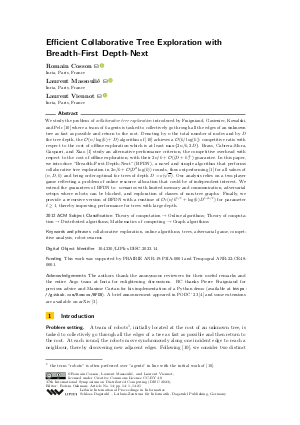@InProceedings{cosson_et_al:LIPIcs.DISC.2023.14,
author = {Cosson, Romain and Massouli\'{e}, Laurent and Viennot, Laurent},
title = {{Efficient Collaborative Tree Exploration with Breadth-First Depth-Next}},
booktitle = {37th International Symposium on Distributed Computing (DISC 2023)},
pages = {14:1--14:21},
series = {Leibniz International Proceedings in Informatics (LIPIcs)},
ISBN = {978-3-95977-301-0},
ISSN = {1868-8969},
year = {2023},
volume = {281},
editor = {Oshman, Rotem},
publisher = {Schloss Dagstuhl -- Leibniz-Zentrum f{\"u}r Informatik},
address = {Dagstuhl, Germany},
URL = {https://drops.dagstuhl.de/entities/document/10.4230/LIPIcs.DISC.2023.14},
URN = {urn:nbn:de:0030-drops-191409},
doi = {10.4230/LIPIcs.DISC.2023.14},
annote = {Keywords: collaborative exploration, online algorithms, trees, adversarial game, competitive analysis, robot swarms}
}

 Creative Commons Attribution 4.0 International license
Creative Commons Attribution 4.0 International license

